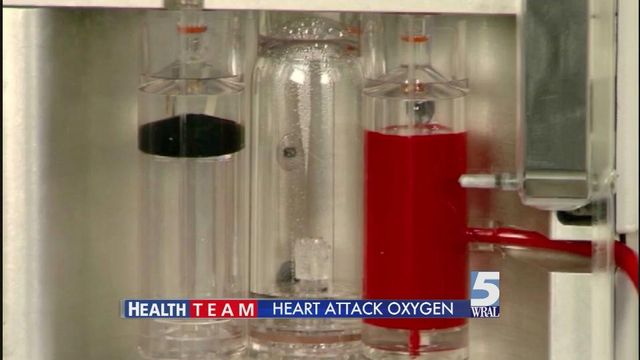New therapy promises quicker recovery after heart attacks
When a heart attack strikes, a quick emergency response is vital. WRAL's Dr. Allen Mask explains a new investigational therapy that promises to do even more to help the heart recover.
Posted — UpdatedCurrent heart attack treatments save lives and minimize damage to the heart, but SuperSaturated Oxygen therapy - a new emergency treatment administered right after a heart attack - promises to do even more to help the heart recover.
Pain in the chest, arms, neck or jaw, shortness of breath, cold sweat and nausea are all symptoms that can indicate a heart attack.
Right now, a balloon angioplasty is the standard emergency care provided immediately after an attack. In this procedure, a wire mesh stent is placed in the vessel to keep it open and expand the blocked heart artery. Though blood flow is restored in that artery, oxygen in the blood may struggle to fill the tiny capillaries.
"Blood needs to get to the capillaries downstream to supply the muscle," Dr. Frances Wood, a WakeMed cardiologist, says. That's what SuperSaturated Oxygen therapy is designed to do.
This procedure, now under investigation, is performed after the stent is placed in the blocked artery. Hospital saline fills one chamber and is then sprayed into a high concentration of oxygen. Then, it's mixed with the patient's own blood and delivered directly into the coronary artery for one hour.
"That allows for oxygen to get to the muscle to allow the vessels to relax," Dr. Wood explains.
During a heart attack, tiny capillaries swell, restricting blood flow. As those cells absorb the new oxygenated plasma, the swelling shrinks back and improves blood flow to surrounding tissue.
Previous clinical trials showed a 26 percent reduction in the size of heart tissue damage compared to patients who received standard care alone. "Recovery is faster," says Dr. Wood. "[Patients] have reduced hospitalizations, reduced repeat infarcts (heart attacks) and survival is better."
WakeMed is among the first of what will be 15 sites across the country offering qualifying patients this new therapy. The only other southeast hospital participating is in Tennessee.
The study plans to enroll 100 patients who fit certain criteria. Participants must be treated within six hours of their first symptoms, and the heart attack must occur in the largest vessel that supplies the front side of the heart.
So far, just one local patient has received the new treatment. Cary Cardiology's Dr. Pratik Desai used the system on a 43-year-old man with diabetes and high blood pressure who suffered a heart attack. Since the treatment is part of a study, officials can't report on the results just yet. The concept is promising, though, and could fill a gap in care for heart attack patients.
• Credits
Copyright 2024 by Capitol Broadcasting Company. All rights reserved. This material may not be published, broadcast, rewritten or redistributed.





